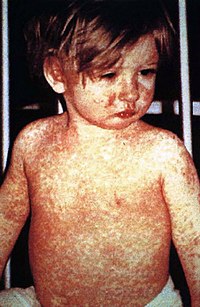
Photo from wikipedia
Maternal dietary protein deficiency and gastrointestinal nematode infection during early pregnancy have negative impacts on both maternal placental gene expression and fetal growth in the mouse. Here we used next-generation… Click to show full abstract
Maternal dietary protein deficiency and gastrointestinal nematode infection during early pregnancy have negative impacts on both maternal placental gene expression and fetal growth in the mouse. Here we used next-generation RNA sequencing to test our hypothesis that maternal protein deficiency and/or nematode infection also alter the expression of genes in the developing fetal brain. Outbred pregnant CD1 mice were used in a 2×2 design with two levels of dietary protein (24% versus 6%) and two levels of infection (repeated sham versus Heligmosomoides bakeri beginning at gestation day 5). Pregnant dams were euthanized on gestation day 18 to harvest the whole fetal brain. Four fetal brains from each treatment group were analyzed using RNA Hi-Seq sequencing and the differential expression of genes was determined by the edgeR package using NetworkAnalyst. In response to maternal H. bakeri infection, 96 genes (88 up-regulated and eight down-regulated) were differentially expressed in the fetal brain. Differentially expressed genes were involved in metabolic processes, developmental processes and the immune system according to the PANTHER classification system. Among the important biological functions identified, several up-regulated genes have known neurological functions including neuro-development (Gdf15, Ing4), neural differentiation (miRNA let-7), synaptic plasticity (via suppression of NF-κβ), neuro-inflammation (S100A8, S100A9) and glucose metabolism (Tnnt1, Atf3). However, in response to maternal protein deficiency, brain-specific serine protease (Prss22) was the only up-regulated gene and only one gene (Dynlt1a) responded to the interaction of maternal nematode infection and protein deficiency. In conclusion, maternal exposure to GI nematode infection from day 5 to 18 of pregnancy may influence developmental programming of the fetal brain.
Journal Title: International journal for parasitology
Year Published: 2018
Link to full text (if available)
Share on Social Media: Sign Up to like & get
recommendations!